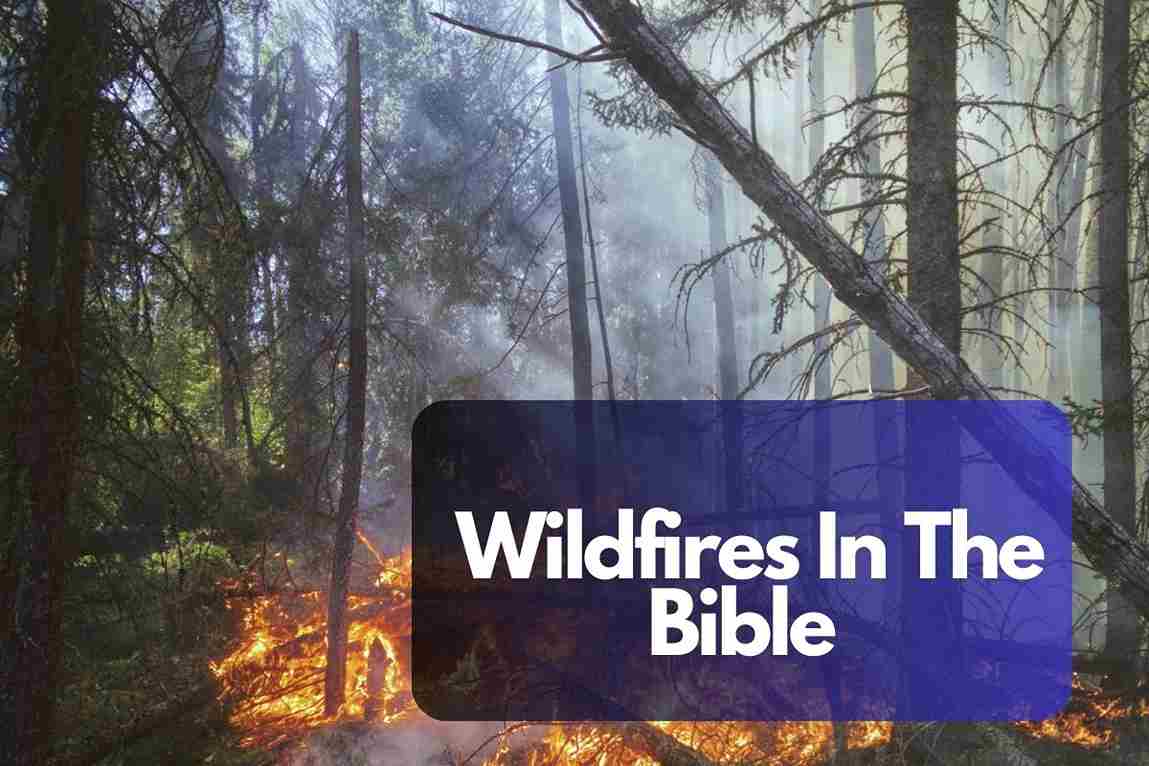Wildfires are natural disasters that have the power to cause immense devastation and capture our attention with their destructive force. In recent years, wildfires have become increasingly common and have been a significant concern worldwide. However, the concept of wildfires is not confined to modern times alone. Surprisingly, the Bible, as a religious text, contains several references to wildfires that hold deep symbolic and metaphorical meanings. These biblical accounts of wildfires offer unique insights into the nature of God, His interaction with humanity, and the lessons we can draw from these fiery events.
In this exploration of “Wildfires in the Bible,” we will delve into the symbolic significance of fire imagery in the biblical context and examine specific instances of wildfires in both the Old and New Testaments. We will uncover the multifaceted meanings associated with these wildfires, ranging from divine presence and guidance to purification, judgment, and empowerment. By understanding the biblical narratives surrounding wildfires, we can gain valuable insights into the lessons they impart, the relevance of these lessons in our lives today, and the enduring messages they convey across generations.
Wildfires In The Bible
Wildfires are uncontrolled fires that rapidly spread across vegetation, consuming forests, grasslands, and other natural landscapes. These fires can be caused by a variety of factors, including lightning strikes, human activities, or volcanic eruptions. Wildfires have significant ecological, environmental, and societal impacts. They can destroy vast areas of land, displace wildlife, release large amounts of greenhouse gases into the atmosphere, and pose a threat to human lives and properties.
Brief Overview of the Bible as a religious text
The Bible is a collection of sacred texts revered by Jews, Christians, and other religious communities. It is divided into two main sections: the Old Testament, which contains the religious writings of ancient Israelites, and the New Testament, which focuses on the life, teachings, and works of Jesus Christ and the early Christian community.
The Bible is considered a foundational text for believers, providing moral guidance, spiritual teachings, and historical accounts. It includes a wide range of literary genres, including narratives, poetry, prophecies, laws, wisdom literature, and letters. The text has been studied, interpreted, and cherished by individuals and communities throughout history, shaping their religious beliefs, practices, and worldviews.
The Bible contains numerous references to fire, including the imagery of wildfires. These references serve various purposes within the religious and moral framework of the text, offering insights into the divine presence, judgment, purification, and transformation. Exploring the occurrences of wildfires in the Bible provides an opportunity to delve deeper into these symbolic and theological themes.
The symbolic meaning of fire in a biblical context
Fire holds significant symbolic meaning in the Bible, representing various concepts and qualities. Here are some symbolic interpretations of fire in the biblical context:
1. Divine Presence: Fire is often associated with the presence of God. In the Old Testament, the burning bush encountered by Moses (Exodus 3:1-6) symbolized God’s presence and holiness. The pillar of fire that guided the Israelites during their journey in the wilderness (Exodus 13:21-22) represented God’s guidance and protection.
2. Purification and Refinement: Fire is a symbol of purification and refinement. It is used metaphorically to illustrate the process of removing impurities or refining character. Just as fire refines and purifies metals, the challenges and trials of life refine and purify individuals, strengthening their faith and character (1 Peter 1:6-7).
3. Spiritual Zeal and Passion: Fire can symbolize zeal, passion, and fervor in one’s spiritual devotion. In the New Testament, the tongues of fire that appeared on the day of Pentecost (Acts 2:1-4) represented the empowering presence of the Holy Spirit and the fervent enthusiasm of the early Christian community.
Fire as a tool of divine judgment
In the Bible, fire is portrayed as a tool of divine judgment, representing God’s righteous anger and punishment for disobedience. Examples of fire being used as a means of divine judgment include:
1. Sodom and Gomorrah: The cities of Sodom and Gomorrah were destroyed by fire and brimstone as a result of their wickedness (Genesis 19:24-25).
2. Nadab and Abihu: The sons of Aaron, Nadab, and Abihu, offered unauthorized fire before the Lord and were consumed by fire as a punishment (Leviticus 10:1-2).
3. Korah’s Rebellion: When Korah and his followers rebelled against Moses and Aaron, fire came from the Lord and consumed them (Numbers 16:35).
Fire as a purifying force
Fire is also depicted as a purifying force in the Bible, representing the transformative work of God in the lives of individuals and communities. Fire symbolizes the process of refining, purging, and sanctifying. Examples include:
1. Elijah and the Prophets of Baal: In the story of Elijah and the prophets of Baal (1 Kings 18:20-39), fire is used to consume the offering on the altar, demonstrating God’s power and validating Elijah’s prophetic ministry.
2. The Refiner’s Fire: In the book of Malachi, God is likened to a refiner’s fire, purifying and refining His people like silver and gold (Malachi 3:2-3). This imagery emphasizes the transformative nature of God’s work in purifying His followers.
Fire, as a purifying force, symbolizes God’s work in purging sin, refining character, and transforming believers into vessels fit for His purpose.
Wildfires in the Old Testament: The Burning Bush
Exodus 3:1-6
– The story of Moses encountering the burning bush is a significant event in the Old Testament.
– Moses, while tending his father-in-law’s flock, sees a bush on fire but not consumed by the flames.
– As Moses approaches, God speaks to him from within the burning bush, instructing him to lead the Israelites out of Egypt.
– The burning bush symbolizes God’s presence and holiness, as fire often represents divine presence in the Bible.
God’s Provision of Fire
Exodus 13:21-22
– As the Israelites leave Egypt during the Exodus, God guides and protects them with a pillar of cloud by day and a pillar of fire by night.
– The pillar of fire serves as a visible manifestation of God’s presence and guidance.
– This fiery pillar leads the Israelites through the wilderness, providing light and assurance during their journey.
God’s Judgment Through Fire
Numbers 11:1-3
– In the book of Numbers, the Israelites complain about their hardships in the wilderness, provoking God’s anger.
– Fire from the Lord breaks out among them and consumes the outskirts of the camp.
– The fire represents divine judgment and serves as a punishment for the Israelites’ discontent and lack of faith.
– The incident highlights the consequences of disobedience and serves as a reminder of God’s authority and justice.
Elijah And The fire From Heaven
1 Kings 18:20-39
– The story of Elijah and the prophets of Baal showcases a dramatic display of fire from heaven.
– Elijah challenges the prophets of Baal to a contest on Mount Carmel to determine which deity is the true God.
– The prophets of Baal call upon their god to send fire upon their altar, but their efforts are in vain.
– In contrast, Elijah prays to the Lord, and fire descends from heaven, consuming his water-drenched altar.
– This miraculous fire demonstrates God’s power and confirms Elijah’s prophetic authority, leading to the defeat of the prophets of Baal.
Wildfires in the New Testament: The Tongues Of Fire
Acts 2:1-4
– On the day of Pentecost, as the disciples were gathered in one place, a sound like a rushing wind filled the room.
– Tongues of fire appeared and rested upon each of them.
– They were filled with the Holy Spirit and began to speak in different languages, enabling them to proclaim the message of Jesus to people from various nations.
– The tongues of fire symbolize the empowering presence of the Holy Spirit, igniting the disciples’ passion and enabling them to boldly spread the Gospel.
The Fiery Trials Of Faith
1 Peter 1:6-7
– The apostle Peter writes to encourage believers who are facing trials and tribulations.
– He compares their faith being tested to the refining process of gold tested by fire.
– The trials, though difficult, serve to refine and purify their faith, making it genuine and bringing glory to God.
– The imagery of fire emphasizes the transformative nature of trials, strengthening believers’ character and deepening their trust in God.
The Lake Of Fire
Revelation 20:14-15
– In the book of Revelation, the lake of fire is described as the final judgment and destination for the devil, the beast, the false prophet, and all who reject God.
– The lake of fire symbolizes eternal punishment and separation from God.
– This imagery highlights the consequences of unbelief and the ultimate judgment for those who reject God’s offer of salvation through Jesus Christ.
Lessons and Themes
God’s presence and guidance in the midst of trials
– The accounts of wildfires in the Bible demonstrate that God’s presence and guidance are not limited to peaceful or prosperous times but extend even to moments of trial and hardship.
– The burning bush and the pillar of fire exemplify how God manifests Himself and leads His people in challenging circumstances.
– These stories remind believers that they can trust in God’s presence and guidance, even when facing difficulties.
The transformative power of God’s purifying fire
– Fire is often used as a symbol of purification and refinement in the Bible.
– The wildfires represent the transformative work of God in purging impurities and refining character.
– Believers can find encouragement in the understanding that the trials they face can lead to personal growth, strengthening their faith, and molding them into the image of Christ.
The consequences of disobedience and divine judgment
– The accounts of God’s judgment through fire illustrate the consequences of disobedience and rebellion.
– The destruction of Sodom and Gomorrah, the punishment of Nadab and Abihu, and the fire consuming the complainers in the wilderness serve as reminders that God’s justice will be executed.
– These stories highlight the importance of obedience and reverence toward God’s commands.
The Holy Spirit’s role in empowering believers
– The tongues of fire at Pentecost symbolize the empowering presence of the Holy Spirit in the lives of believers.
– The Holy Spirit provides guidance, empowerment, and boldness to proclaim the Gospel.
– Believers can rely on the Holy Spirit’s power and presence to fulfill their calling and live out their faith effectively.
Contemporary Application
Metaphorical parallels between wildfires and life challenges
– Wildfires can serve as a metaphor for the challenges and trials individuals face in their lives.
– Just as wildfires can quickly spread and consume vast areas, life challenges can be overwhelming and seem insurmountable.
– However, like wildfires, challenges can also lead to growth, transformation, and the development of resilience.
– Understanding the parallels between wildfires and life challenges can provide perspective and encouragement to navigate difficult times.
Encouragement for perseverance in faith during difficult times
– The biblical narratives of wildfires offer encouragement for believers to persevere in their faith during challenging circumstances.
– Just as God’s presence and guidance were evident in the midst of wildfires in the Bible, believers can trust that God is with them in their trials.
– The transformative power of God’s purifying fire can inspire believers to endure and grow stronger in their faith.
– Drawing inspiration from these narratives, believers can find the strength to persevere, knowing that God is working through their challenges for their ultimate good.
Stewardship of creation and prevention of physical wildfires
– The presence of wildfires in the Bible also highlights the importance of stewardship of the natural world and the prevention of physical wildfires.
– Believers are called to care for and responsibly manage the environment, recognizing that the Earth is a gift from God.
– This includes taking measures to prevent wildfires by practicing responsible land management, adhering to fire safety guidelines, and promoting conservation efforts.
– The biblical narratives can inspire believers to be mindful of their impact on the environment and to actively participate in efforts to protect and preserve it.
Conclusion
Wildfires in the Bible carry symbolic and metaphorical meanings, representing themes such as divine presence, judgment, purification, and transformation. The accounts of wildfires in the Bible provide lessons on God’s presence in trials, the transformative power of challenges, the consequences of disobedience, and the empowerment of the Holy Spirit.
The symbolism of wildfires helps believers understand the nature of trials, judgment, and the empowering presence of the Holy Spirit. The narratives of wildfires in the Bible continue to resonate with individuals today, providing timeless insights into the human experience and the nature of God. The biblical narratives also call believers to be responsible stewards of creation and to actively prevent physical wildfires.
Ultimately, the imagery of wildfires in the Bible invites believers to reflect on their relationship with God, embrace transformation through challenges, and live out their faith with courage and conviction.







